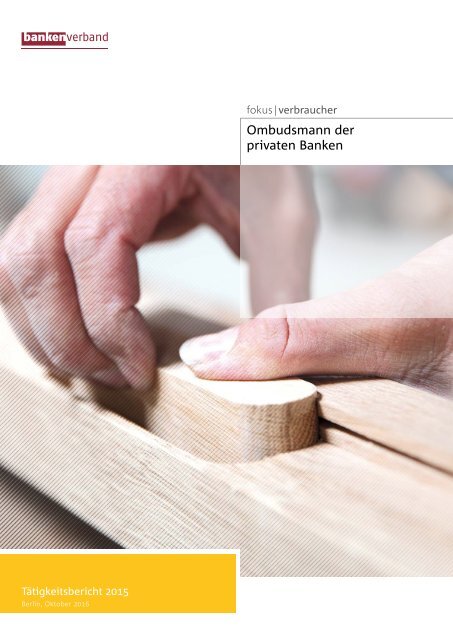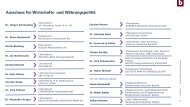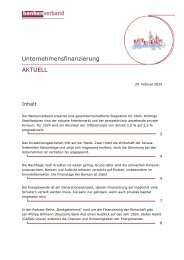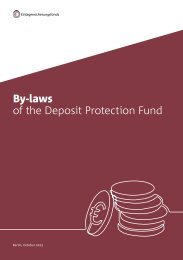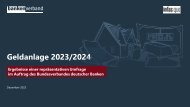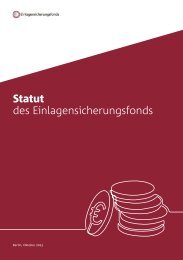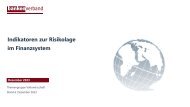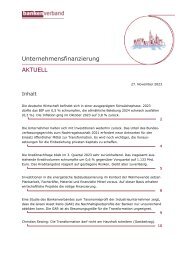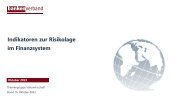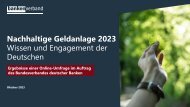Summary of the Ombudsman's Report 2015
To settle disputes between banks and their customers as quickly and smoothly as possible, Germany's private commercial banks introduced an out-of-court conciliation procedure as early as 1992: the Ombudsman Scheme.
To settle disputes between banks and their customers as quickly and smoothly as possible, Germany's private commercial banks introduced an out-of-court conciliation procedure as early as 1992: the Ombudsman Scheme.
Create successful ePaper yourself
Turn your PDF publications into a flip-book with our unique Google optimized e-Paper software.
fokus|verbraucher<br />
Ombudsmann der<br />
privaten Banken<br />
Tätigkeitsbericht <strong>2015</strong><br />
Berlin, Oktober 2016
6<br />
<strong>Summary</strong> <strong>of</strong> <strong>the</strong> Ombudsman’s <strong>Report</strong> <strong>2015</strong><br />
6.1 The private commercial banks’<br />
Ombudsman Scheme in Germany and<br />
Europe<br />
New legal framework<br />
Consumer Disputes in May 2013, <strong>the</strong> main German<br />
legislation implementing it, <strong>the</strong> Consumer Dispute<br />
Resolution Act (Verbraucherstreitbeilegungsgesetz), was<br />
debated in <strong>2015</strong> before largely coming into force on 1<br />
April 2016. This law meant that out-<strong>of</strong>-court dispute<br />
resolution was finally introduced cross-sectorally in all<br />
The Ombudsman’s <strong>Report</strong> 2014 was dominated by <strong>the</strong><br />
member states.<br />
flood <strong>of</strong> complaints triggered by <strong>the</strong> German Federal<br />
Court <strong>of</strong> Justice ruling on consumer loan processing<br />
fees. While meeting this quite exceptional challenge<br />
had a considerable impact on <strong>2015</strong> as well, o<strong>the</strong>r issues<br />
came to <strong>the</strong> fore again in <strong>the</strong> course <strong>of</strong> <strong>the</strong> year – first<br />
and foremost, preparation for implementation <strong>of</strong> a<br />
gradually established legal framework for <strong>the</strong> out<strong>of</strong>-court<br />
dispute resolution schemes in <strong>the</strong> European<br />
Union and in Germany. Following <strong>the</strong> adoption <strong>of</strong><br />
<strong>the</strong> EU Directive on Alternative Dispute Resolution for<br />
The banking industry is, however, subject to special<br />
provisions that take precedence over <strong>the</strong> Consumer<br />
Dispute Resolution Act. On <strong>the</strong> basis <strong>of</strong> Section 14<br />
<strong>of</strong> <strong>the</strong> Injunctions Act (Unterlassungsklagengesetz), a<br />
draft Financial Dispute Resolution Schemes Regulation<br />
(Finanzschlichtungsstellenverordnung) was presented<br />
in mid-June 2016. This regulation deals with <strong>the</strong><br />
requirements for formal recognition <strong>of</strong> out-<strong>of</strong>-court<br />
dispute resolution schemes in <strong>the</strong> financial sector and is<br />
At a glance – a chronology <strong>of</strong> measures establishing <strong>the</strong> legal framework for consumer dispute resolution<br />
May 2013<br />
May 2013<br />
November <strong>2015</strong><br />
January 2016<br />
February 2016<br />
April 2016<br />
April 2016<br />
June 2016<br />
EU Directive<br />
on Alternative<br />
Dispute<br />
Resolution<br />
for Consumer<br />
Disputes<br />
EU Regulation<br />
on Online<br />
Dispute Resolution<br />
(ODR)<br />
for Consumer<br />
Disputes<br />
German<br />
Regulation on<br />
Information<br />
and <strong>Report</strong>ing<br />
Requirements<br />
under <strong>the</strong><br />
Consumer<br />
Dispute Resolution<br />
Act<br />
ODR Regulation<br />
comes<br />
into force and<br />
thus information<br />
requirements<br />
under<br />
Article 14 (1)<br />
and (2) <strong>of</strong> <strong>the</strong><br />
ODR Regulation<br />
apply<br />
European<br />
Commission’s<br />
ODR platform<br />
effectively<br />
launched<br />
German<br />
Consumer<br />
Dispute Resolution<br />
Act<br />
largely comes<br />
into force<br />
German private<br />
commercial<br />
banks’<br />
Ombudsman<br />
Scheme<br />
applies until<br />
its formal<br />
recognition as<br />
a consumer<br />
dispute resolution<br />
scheme;<br />
Section<br />
14 (3) <strong>of</strong> <strong>the</strong><br />
Injunctions<br />
Act<br />
Draft German<br />
Financial<br />
Dispute<br />
Resolution<br />
Schemes<br />
Regulation<br />
70 Tätigkeitsbericht <strong>2015</strong>
ankenverband<br />
<strong>the</strong> centrepiece <strong>of</strong> <strong>the</strong> legal framework for <strong>the</strong> German<br />
private commercial banks’ Ombudsman Scheme. It had<br />
not yet been adopted at <strong>the</strong> time this report went to<br />
print.<br />
Consumer protection at EU level: FIN-NET<br />
Beyond <strong>the</strong> legal framework, organisational structures<br />
at EU level support <strong>the</strong> establishment <strong>of</strong> a level<br />
playing field for out-<strong>of</strong>-court dispute resolution in <strong>the</strong><br />
European Union. The Association <strong>of</strong> German Banks’<br />
Ombudsman Scheme is, for example, a member <strong>of</strong><br />
FIN-NET, launched by <strong>the</strong> European Commission in<br />
2001. FIN-NET is a cross-border out-<strong>of</strong>-court complaints<br />
network for financial services in <strong>the</strong> EU to which 59<br />
national alternative dispute resolution (ADR) schemes<br />
are currently affiliated. FIN-NET is designed to facilitate<br />
<strong>the</strong> settlement <strong>of</strong> complaints where <strong>the</strong> service provider<br />
is located in an EU member state o<strong>the</strong>r than that where<br />
<strong>the</strong> consumer lives, <strong>the</strong>reby avoiding lengthy and costly<br />
cross-border litigation. The German private commercial<br />
banks’ Ombudsman Scheme received a total <strong>of</strong> 29 crossborder<br />
complaints in <strong>2015</strong>. Nine were submitted to its<br />
Customer Complaints Office as <strong>the</strong> nearest ADR scheme 1)<br />
and forwarded to <strong>the</strong> relevant foreign ADR scheme.<br />
Twenty complaints were submitted to <strong>the</strong> Ombudsman<br />
Scheme as <strong>the</strong> relevant ADR scheme 2) . These were, in<br />
particular, complaints by German citizens (temporarily)<br />
resident abroad but still customers <strong>of</strong> a German private<br />
commercial bank. Complaints by citizens in o<strong>the</strong>r EU<br />
countries asserting claims arising from a dispute with a<br />
German bank were in <strong>the</strong> minority, on <strong>the</strong> o<strong>the</strong>r hand.<br />
This is due to <strong>the</strong> fact that – not only because <strong>of</strong> <strong>the</strong><br />
language barriers – cross-border banking is still not yet<br />
conducted on any significant scale today.<br />
1) The “nearest” scheme within <strong>the</strong> meaning <strong>of</strong> FIN-NET is an ADR scheme for <strong>the</strong> corresponding financial services sector in <strong>the</strong><br />
consumer’s country <strong>of</strong> residence that need not be <strong>the</strong> relevant scheme.<br />
2) The “relevant scheme” within <strong>the</strong> meaning <strong>of</strong> FIN-NET is <strong>the</strong> ADR scheme for <strong>the</strong> financial services concerned in <strong>the</strong> country where<br />
<strong>the</strong> service provider is domiciled or has its head <strong>of</strong>fice.<br />
Tätigkeitsbericht <strong>2015</strong> 71
6<br />
6.2 The private commercial banks’<br />
Ombudsman Scheme<br />
The Ombudsman Scheme<br />
The ombudspersons <strong>the</strong>mselves:<br />
After more than 13 years <strong>of</strong> committed and successful<br />
service, Werner Weiß, former presiding judge at <strong>the</strong><br />
Munich Higher Regional Court and senior justice<br />
ministry <strong>of</strong>ficial in Bavaria, retired as an ombudsman<br />
The Association <strong>of</strong> German Banks has six ombudspersons<br />
– retired senior judges and ministry <strong>of</strong>ficials. Use <strong>of</strong> <strong>the</strong><br />
Ombudsman Scheme is free <strong>of</strong> charge for customers,<br />
on 31 March <strong>2015</strong>. He was succeeded on 1 April <strong>2015</strong><br />
by Dr Peter Frellesen, former deputy presiding judge <strong>of</strong><br />
Civil Panel VIII at <strong>the</strong> German Federal Court <strong>of</strong> Justice.<br />
and <strong>the</strong> ombudspersons are independent and impartial.<br />
They make <strong>the</strong>ir decisions solely according to <strong>the</strong> law,<br />
taking due account <strong>of</strong> <strong>the</strong> principles <strong>of</strong> fairness and<br />
justice. If customers are successful with <strong>the</strong>ir complaint,<br />
Dr Gerhart Kreft, former presiding judge <strong>of</strong> Civil Panel<br />
IX at <strong>the</strong> German Federal Court <strong>of</strong> Justice, has been<br />
serving as an ombudsman since October 2004.<br />
<strong>the</strong>y obtain redress or remedial action without <strong>the</strong> need<br />
for any lengthy and time-consuming litigation. Banks<br />
have undertaken to accept ombudsperson decisions<br />
in disputes involving amounts up to EUR 10,000. The<br />
Ekkehard Bombe, former president <strong>of</strong> <strong>the</strong> Wiesbaden<br />
Regional Court and judge at <strong>the</strong> Constitutional Court <strong>of</strong><br />
Hesse, took up <strong>of</strong>fice as an ombudsman in January 2006.<br />
limitation period for customers’ claims is suspended<br />
on <strong>the</strong> basis <strong>of</strong> <strong>the</strong> relevant statutory limitation<br />
provisions for <strong>the</strong> duration <strong>of</strong> <strong>the</strong> Ombudsman Scheme<br />
proceedings. In addition, complainants are not bound<br />
by <strong>the</strong> ombudsperson’s decision, so that <strong>the</strong>y can still<br />
Dr Gerda Müller, former presiding judge <strong>of</strong> Civil Panel<br />
VI and vice-president <strong>of</strong> <strong>the</strong> German Federal Court<br />
<strong>of</strong> Justice, was appointed <strong>the</strong> Association <strong>of</strong> German<br />
Banks’ first ombudswoman in August 2009.<br />
pursue <strong>the</strong> matter fur<strong>the</strong>r before a court <strong>of</strong> law after<br />
<strong>the</strong> decision has been announced.<br />
Dr. Rainer Mößinger, former president <strong>of</strong> <strong>the</strong> Hanau<br />
Regional Court and deputy member <strong>of</strong> <strong>the</strong> Constitutional<br />
The ombudspersons<br />
Court <strong>of</strong> Hesse, joined <strong>the</strong> ombudsperson team in June<br />
2010.<br />
The high level <strong>of</strong> public acceptance that <strong>the</strong> private<br />
commercial banks’ Ombudsman Scheme enjoys is due<br />
to a great extent to <strong>the</strong> quality <strong>of</strong> <strong>the</strong> ombudspersons<br />
<strong>the</strong>mselves. These are former senior judges or legal<br />
pr<strong>of</strong>essionals whose personality and proven expertise<br />
Angelika Lange, former deputy presiding judge <strong>of</strong> a<br />
panel at <strong>the</strong> Frankfurt am Main Higher Regional Court<br />
dealing mainly with banking matters, became <strong>the</strong><br />
second ombudswoman in September 2011.<br />
ensure impartial proceedings.<br />
72 Tätigkeitsbericht <strong>2015</strong>
ankenverband<br />
6.3 Basic features <strong>of</strong> <strong>the</strong> Ombudsman<br />
Scheme<br />
banking sector” (Ombudsman Scheme Rules). These<br />
can be downloaded from <strong>the</strong> Association <strong>of</strong> German<br />
Banks’ website at en.bankenverband.de/booklets.<br />
Organisation<br />
The Ombudsman Scheme Rules, which date back to<br />
A Customer Complaints Office was set up at <strong>the</strong><br />
Association <strong>of</strong> German Banks in Berlin to handle<br />
incoming customer complaints. It is entrusted with<br />
organising <strong>the</strong> Ombudsman Scheme proceedings<br />
and is, as it were, <strong>the</strong> “gateway” to <strong>the</strong> scheme. A<br />
legal examination <strong>of</strong> <strong>the</strong> complaints is <strong>the</strong> job <strong>of</strong> <strong>the</strong><br />
ombudspersons <strong>the</strong>mselves. The Customer Complaints<br />
Office is headed by a fully qualified lawyer.<br />
<strong>the</strong> launch <strong>of</strong> <strong>the</strong> scheme in 1992, were aligned most<br />
recently with <strong>the</strong> current legal situation following<br />
implementation <strong>of</strong> <strong>the</strong> EU Payment Services Directive<br />
and <strong>the</strong> resulting new law on payments that came<br />
into force on 31 October 2009, as well as changes to<br />
<strong>the</strong> German Dispute Resolution Schemes Procedural<br />
Regulation (Schlichtungsstellenverfahrensverordnung).<br />
Fur<strong>the</strong>r changes to <strong>the</strong> Ombudsman Scheme and <strong>the</strong><br />
Ombudsman Scheme Rules are made necessary by <strong>the</strong><br />
Ombudsman Scheme rules and procedure<br />
German Consumer Dispute Resolution Act and <strong>the</strong> draft<br />
Financial Dispute Resolution Schemes Regulation. The<br />
How <strong>the</strong> Ombudsman Scheme works is set out in<br />
detail in <strong>the</strong> “Rules <strong>of</strong> procedure for <strong>the</strong> settlement <strong>of</strong><br />
latter had not yet been adopted at <strong>the</strong> time this report<br />
went to print.<br />
customer complaints in <strong>the</strong> German private commercial<br />
Ombudsman Scheme proceedings: an overview<br />
Written complaint from<br />
bank customer<br />
Examination: Ombudsman<br />
Scheme right address?<br />
Yes<br />
No<br />
Complaint forwarded to<br />
responsible scheme or<br />
returned to customer<br />
Forwarded to bank for<br />
comment<br />
Yes<br />
Examination: complaint<br />
admissible?<br />
No<br />
Ombudsperson’s decision<br />
on admissibility<br />
Complaint admissible<br />
Complaint inadmissible<br />
Response by bank<br />
Redress or remedial action<br />
by bank<br />
Case closed<br />
Customer entitled to reply<br />
Ombudsperson’s decision<br />
Source: Association <strong>of</strong> German Banks.<br />
Tätigkeitsbericht <strong>2015</strong> 73
6<br />
6.4 Review <strong>of</strong> <strong>the</strong> year: <strong>2015</strong><br />
In <strong>2015</strong>, <strong>the</strong> Customer Complaints Office received a<br />
total <strong>of</strong> 22,245 complaints. The lion’s share <strong>of</strong> <strong>the</strong>se<br />
again concerned reimbursement <strong>of</strong> consumer loan<br />
processing fees. The remaining complaints covered all<br />
aspects <strong>of</strong> banking business. It should be noted that a<br />
comparison <strong>of</strong> <strong>the</strong> number <strong>of</strong> complaints received in<br />
<strong>2015</strong> with previous years, excluding <strong>the</strong> special effect <strong>of</strong><br />
consumer loan processing fees, reveals that in <strong>2015</strong> <strong>the</strong><br />
figure was around <strong>the</strong> same or actually slightly lower<br />
than that for earlier years.<br />
Number <strong>of</strong> complaints received by <strong>the</strong><br />
Ombudsman Scheme 2011–<strong>2015</strong><br />
108,565<br />
8,268<br />
7,180<br />
6,551<br />
22,245<br />
The experience made so far is that <strong>the</strong> way incoming<br />
complaints are spread over <strong>the</strong> course <strong>of</strong> <strong>the</strong> year does<br />
not vary: <strong>the</strong> number <strong>of</strong> complaints received in December<br />
is usually much higher than <strong>the</strong> annual average. In<br />
<strong>2015</strong>, for example – excluding <strong>the</strong> above-mentioned<br />
major special effect – 24% <strong>of</strong> complaints were received<br />
in December. This is because <strong>the</strong> Ombudsman Scheme<br />
is being used increasingly also for tactical reasons, i.e.<br />
to obtain a suspension <strong>of</strong> <strong>the</strong> statutory limitation period<br />
by means <strong>of</strong> a complaint. Whe<strong>the</strong>r this will change<br />
in future following several German Federal Court <strong>of</strong><br />
Justice rulings on 18 June <strong>2015</strong> remains to be seen.<br />
Through <strong>the</strong>se rulings, <strong>the</strong> German Federal Court <strong>of</strong><br />
Justice stipulated <strong>the</strong> requirements for applications for<br />
2011 2012 2013 2014 <strong>2015</strong><br />
Source: Association <strong>of</strong> German Banks; as at 31 August 2016.<br />
conciliation proceedings leading to suspension <strong>of</strong> <strong>the</strong><br />
limitation period for claims due to faulty investment<br />
advice in accordance with Section 204 (1), sentence 1<br />
<strong>of</strong> <strong>the</strong> German Civil Code (BGB). These requirements<br />
state that such applications should always describe <strong>the</strong><br />
investment in question, indicate <strong>the</strong> amount invested<br />
and <strong>the</strong> approximate time when investment advice was<br />
given, and at least roughly outline <strong>the</strong> course <strong>of</strong> events.<br />
As a result, <strong>the</strong> requirements for complaints addressed<br />
to <strong>the</strong> private commercial banks’ Ombudsman Scheme<br />
have also been raised.<br />
The table above shows <strong>the</strong> number <strong>of</strong> complaints<br />
against member banks received annually between 2011<br />
and <strong>2015</strong>. Besides <strong>the</strong> 22,245 complaints filed against<br />
member banks in <strong>2015</strong>, some 14,047 complaints and<br />
inquiries concerning banks that are not members <strong>of</strong> <strong>the</strong><br />
Association <strong>of</strong> German Banks have been received over<br />
<strong>the</strong> past five years. Of <strong>the</strong>se, 2,243 were complaints for<br />
which <strong>the</strong> Association <strong>of</strong> German Banks was not <strong>the</strong><br />
right address. These complaints were forwarded to <strong>the</strong><br />
respective ADR schemes. This figure has risen sharply<br />
compared with previous years (except 2014).<br />
74 Tätigkeitsbericht <strong>2015</strong>
ankenverband<br />
In <strong>2015</strong>, 2,376 complaints were not followed up by<br />
<strong>the</strong> complainants. These were mostly cases where<br />
<strong>the</strong> complainant failed to submit missing documents<br />
or withdrew <strong>the</strong> application for Ombudsman Scheme<br />
proceedings. These cases were not adjudicated by <strong>the</strong><br />
ombudspersons. A total <strong>of</strong> 2,943 <strong>of</strong> <strong>the</strong> complaints<br />
received in <strong>2015</strong> were inadmissible or ineligible under<br />
<strong>the</strong> Ombudsman Scheme Rules. These included, for<br />
example, complaints where <strong>the</strong> complainant was not<br />
a customer <strong>of</strong> <strong>the</strong> bank concerned or did not qualify<br />
as a consumer and an exception under Section 2 (1) (b)<br />
<strong>of</strong> <strong>the</strong> Ombudsman Scheme Rules did not apply ei<strong>the</strong>r.<br />
In some 1,570 <strong>of</strong> <strong>the</strong> inadmissible complaints, it was<br />
not possible to finally clarify <strong>the</strong> matter through <strong>the</strong><br />
presentation <strong>of</strong> documents, so that fur<strong>the</strong>r evidence<br />
would have had to be taken to enable a decision by<br />
an ombudsperson. In <strong>the</strong>se cases, <strong>the</strong> ombudspersons<br />
refrained from adjudicating in accordance with Section<br />
4 (4), sentence 3 <strong>of</strong> <strong>the</strong> Ombudsman Scheme Rules. In<br />
addition, <strong>the</strong> ombudspersons took no action in 780<br />
cases, as <strong>the</strong> claim concerned was already barred under<br />
<strong>the</strong> statute <strong>of</strong> limitations and <strong>the</strong> bank had pled <strong>the</strong><br />
statute <strong>of</strong> limitations.<br />
Where banks examine a complaint internally and<br />
find it to be legitimate, <strong>the</strong>y <strong>of</strong>fer redress or remedial<br />
action. Ombudsman Scheme proceedings are <strong>the</strong>n no<br />
longer necessary. Often, simply explaining banking<br />
procedures or sometimes complex and abstract<br />
banking transactions in plain language takes care <strong>of</strong><br />
any disputes in advance.<br />
In addition, <strong>the</strong> Ombudsman Scheme Rules stipulate<br />
that <strong>the</strong> ombudspersons are not allowed to adjudicate<br />
Overview <strong>of</strong> number and outcome <strong>of</strong> complaints received annually: 2011–<strong>2015</strong><br />
Year 2011 2012 2013 2014 <strong>2015</strong><br />
Total number <strong>of</strong> complaints 8,268 7,180 6,551 108,564 2) 22,245 3)<br />
Complaints not followed up by customers 1,590 996 845 5,573 2,376<br />
Inadmissible/ineligible 1) complaints under <strong>the</strong><br />
Ombudsman Scheme Rules<br />
2,585 2,495 2,357 4,413 2,943<br />
Admissible complaints under <strong>the</strong> Ombudsman Scheme Rules 4,093 3,689 3,349 98,579 4) 16,926 5)<br />
Complaints resolved in favour <strong>of</strong> customer (also partly) 2,182 1,825 1,796 94,347 14,302<br />
Compromise proposed by ombudsman 197 585 481 326 222<br />
Complaints resolved in favour <strong>of</strong> bank 1,714 1,279 1,072 2,490 1,459<br />
1) Admissible complaints under <strong>the</strong> Ombudsman Scheme Rules which <strong>the</strong> ombudsman never<strong>the</strong>less refrains from adjudicating because<br />
fur<strong>the</strong>r evidence-taking would be necessary.<br />
2) Of <strong>the</strong> 108,565 complaints, 102,834 concern consumer loan processing fees.<br />
3) Of <strong>the</strong> 22,245 complaints, 15,483 concern consumer loan processing fees.<br />
4) Of <strong>the</strong> 98,579 admissible complaints, 4,416 are still being processed.<br />
5) Of <strong>the</strong> 16,926 admissible complaints, 943 are still being processed.<br />
Source: Association <strong>of</strong> German Banks; as at 31 August 2016.<br />
Tätigkeitsbericht <strong>2015</strong> 75
6<br />
in legal issues <strong>of</strong> general importance. This is particularly<br />
<strong>the</strong> case if a fundamental legal issue is due to be dealt<br />
with at highest-court level.<br />
Of particular interest is naturally <strong>the</strong> question <strong>of</strong> whom<br />
<strong>the</strong> scales tip towards in <strong>the</strong> outcome <strong>of</strong> ombudsman<br />
proceedings. The experience over <strong>the</strong> years is that<br />
around 50% <strong>of</strong> complaints are usually settled in favour<br />
<strong>of</strong> customers. These are complaints that are resolved<br />
by <strong>the</strong> ombudspersons or settled amicably in advance.<br />
This average figure does not apply to <strong>2015</strong>, however:<br />
at <strong>the</strong> time this report went to print, around 84% <strong>of</strong> <strong>the</strong><br />
admissible complaints dealt with under <strong>the</strong> Ombudsman<br />
Scheme in <strong>2015</strong> had been settled in favour <strong>of</strong> customers<br />
and only just under 9% in favour <strong>of</strong> banks. This is due<br />
to <strong>the</strong> fact that <strong>the</strong> German Federal Court <strong>of</strong> Justice<br />
rulings on consumer loan processing fees allowed little<br />
room for any decisions o<strong>the</strong>r than a reimbursement <strong>of</strong><br />
such fees. In 222 cases, <strong>the</strong> ombudsmen proposed a<br />
compromise to <strong>the</strong> parties involved. At <strong>the</strong> time this<br />
report went to print, 112 compromises had been<br />
accepted.<br />
76 Tätigkeitsbericht <strong>2015</strong>
ankenverband<br />
6.5 Complaint areas<br />
Depending on <strong>the</strong>ir main focus, <strong>the</strong> complaints received<br />
by <strong>the</strong> Customer Complaints Office are assigned for<br />
statistical purposes to one <strong>of</strong> <strong>the</strong> following areas:<br />
• Securities business<br />
• Lending business<br />
• Payments business<br />
• Basic account<br />
• Savings business<br />
• Guarantees/third-party security<br />
• Miscellaneous<br />
The complaints received usually concern all areas <strong>of</strong><br />
banking business. One area led by a long way in <strong>2015</strong>,<br />
however: lending business.<br />
To illustrate this, a table is included below showing <strong>the</strong><br />
trend in complaints between 2011 and <strong>2015</strong>. It splits<br />
lending business into consumer loan processing fees<br />
and o<strong>the</strong>r lending business.<br />
The figures for <strong>the</strong> o<strong>the</strong>r areas (securities business,<br />
payments business, basic account, guarantees/thirdparty<br />
security) remained largely stable.<br />
Complaint areas 2011–<strong>2015</strong><br />
Lending business is split into consumer loan processing fees and o<strong>the</strong>r lending business<br />
Year 2011 2012 2013 2014 <strong>2015</strong><br />
Securities business 4,578 2,637 2,388 2,717 2,812<br />
in per cent 55.4 36.7 36.5 2.5 12.6<br />
Lending business 1,550 846 891 1,387 2,146<br />
in per cent 18.7 11.8 13.6 1.3 9.6<br />
Consumer loan processing fees 1) 130 1,702 1,464 102,834 15,483<br />
in per cent 1.6 23.7 22.3 94.7 69.6<br />
Payments business 1,373 1,409 1,263 1,204 1,357<br />
in per cent 16.6 19.6 19.3 1.1 6.1<br />
Basic account 274 236 198 146 132<br />
in per cent 3.3 3.3 3.0 0.1 0.6<br />
Savings business 274 259 295 241 279<br />
in per cent 3.3 3.6 4.5 0.2 1.3<br />
Guarantees/third-party security 20 16 10 8 8<br />
in per cent 0.3 0.2 0.2 < 0.1 0.1<br />
Miscellaneous 69 75 42 28 28<br />
in per cent 0.8 1.1 0.6 < 0.1 0.1<br />
Total 8,268 7,180 6,551 108,565 22,245<br />
1) Special effect caused by <strong>the</strong> German Federal Court <strong>of</strong> Justice ruling <strong>of</strong> 28 October 2014 on <strong>the</strong> inadmissibility <strong>of</strong> consumer loan processing fees.<br />
Source: Association <strong>of</strong> German Banks; as at 31 August 2016.<br />
Tätigkeitsbericht <strong>2015</strong> 77
Impressum<br />
Herausgeber Bundesverband deutscher Banken e. V.<br />
Postfach 040307, 10062 Berlin<br />
Verantwortlich Iris Bethge<br />
Druck<br />
Gestaltung<br />
PieReg Druckcenter Berlin<br />
doppel:punkt redaktionsbüro janet eicher,<br />
Andreas Recek, Bonn<br />
Fotos<br />
Andreas Kühlken, Köln<br />
Gedruckt Oktober 2016
So erreichen Sie den Bankenverband<br />
Per Post:<br />
Bundesverband deutscher Banken<br />
Postfach 040307<br />
10062 Berlin<br />
Per Telefon:<br />
+49 30 1663-0<br />
Per Fax:<br />
+49 30 1663-1399<br />
Per E-Mail:<br />
bankenverband@bdb.de<br />
Im Internet:<br />
bankenverband.de<br />
bankenombudsmann.de<br />
Scannen Sie diesen QR-Code<br />
für weiterführende Informationen<br />
zum Ombudsmannverfahren.<br />
Social Media:<br />
twitter.com/bankenverband<br />
youtube.com/user/bankenverb<br />
flickr.com/photos/bankenverband


